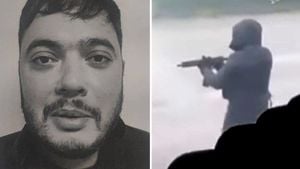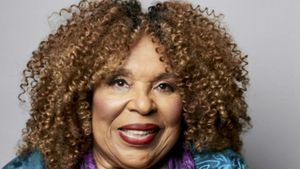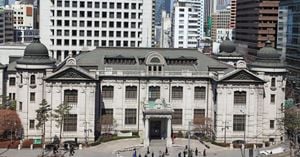On Monday evening, four candidates vying for the leadership of the federal Liberal Party of Canada engaged in their first debate before party members, and all eyes were on Montreal as they presented their views on pressing issues shaping the nation. The debate was held at 8 p.m. EST, moderated by former TVA-Québec anchor Pierre Jobin, and marked the only opportunity for Liberal supporters to see the candidates together before they head to the polls.
This debate is particularly significant as it pits candidates against the backdrop of Prime Minister Justin Trudeau's impending resignation on March 9, the date when the party will elect its new leader. With advance voting set to open this Wednesday, the urgency for candidates to make their case has never been more pronounced. The contenders included Mark Carney, former governor of the Bank of Canada; Chrystia Freeland, the former finance minister; Karina Gould, former government House leader; and Frank Baylis, former Liberal MP. Sadly, Ruby Dhalla, another candidate hopeful, was disqualified from the contest.
Throughout the debate, each candidate took the chance to outline their visions for Canada’s future, covering topics such as the economy, housing, climate change, and healthcare. Carney, who appears to be leading the race, discussed his proposals focusing on economic resilience and tax reform. His campaign has hinted at plans to scrap the capital gains tax changes enacted by Trudeau’s government and to bolster tax cuts for the middle class.
Freeland, attempting to distinguish herself from Trudeau, who she served alongside as finance minister, committed to shutting down the consumer carbon tax and putting forth measures to revitalize the economy, such as reducing living costs for Canadians. She has positioned herself as an experienced negotiator ready to confront international challenges, especially concerning trade and relations with the United States.
Young and energetic, Gould emerged as another key player during the debate. Her focus has been on affordability and equality, pledging to temporarily reduce the Goods and Services Tax (GST) to 4% for one year and widens eligibility for employment insurance. She established herself as the voice of Canada’s youth, advocating for reforms to make life more affordable.
Baylis proposed numerous reforms, emphasizing the introduction of term limits for MPs and senators, investments in green technology, and modernization of healthcare delivery through new technologies. His specifics were presented as structured 3-point plans, aiming to resonate with voters concerned about the efficacy of governance.
The debate covered how candidates would navigate Canada-U.S. relations, tackle climate issues, and manage healthcare — concerns high on voters’ minds as the election looms. All candidates demonstrated their commitment to the Liberal core values, including preserving significant programs like child care, dental care, and extending public coverage of medication.
With no additional debates until the following night when the English-language debate is scheduled, candidates faced the challenge of conveying their messages compellingly, particularly to French-speaking voters, who play pivotal roles within Liberal constituencies.
Following the debate, political analysts Rosemary Barton and David Cochrane, from CBC News, highlighted how each candidate's approach could resonate with different segments of the electorate. Every performance was dissected, addressing who managed to impress and who may have stumbled.
This leadership race is notable not only for the intense competition but also for the new rules instituted by the Liberal Party, restricting voting rights to permanent residents and Canadian citizens—a change from previous practices meant to mitigate foreign interference concerns.
With voting approaching and the political stakes high, the showdown on Monday showcased candidates’ abilities to think on their feet and present ideas clearly. Voters are left to ponder which candidate aligns best with their aspirations for Canada.



